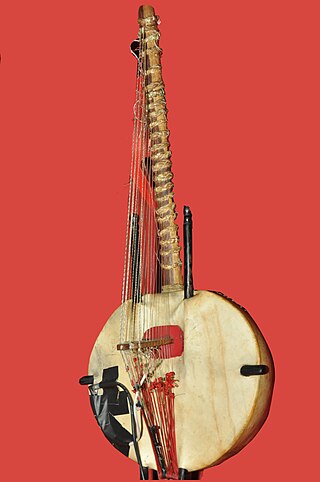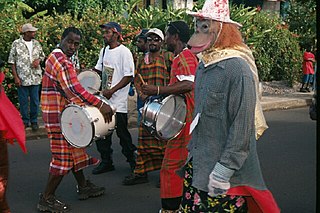
The kora is a stringed instrument used extensively in West Africa. A kora typically has 21 strings, which are played by plucking with the fingers. It combines features of the lute and harp.

Youssou N'Dour is a Senegalese singer, songwriter, musician, composer, occasional actor, businessman, and politician. In 2004, Rolling Stone described him as, "perhaps the most famous singer alive" in Senegal and much of Africa and in 2023, the same publication ranked him at number 69 on its list of the 200 Greatest Singers of All Time. From April 2012 to September 2013, he was Senegal's Minister of Tourism.

The music of Dominica includes a variety of genres including all the popular genres of the world. Popular music is widespread, with a number of native Dominican performers gaining national fame in imported genres such as calypso, reggae, soca, kompa, zouk and rock and roll. Dominica's own popular music industry has created a form called bouyon, which combines elements from several styles and has achieved a wide fanbase in Dominica. Groups include WCK, Native musicians in various forms, such as reggae, kadans (Ophelia Marie, and calypso, have also become stars at home and abroad.

The music of the Gambia is closely linked musically with that of its neighbor, Senegal, which surrounds its inland frontiers completely. Among its prominent musicians is Foday Musa Suso. Mbalax is a widely known popular dance music of the Gambia and neighbouring Senegal. It fuses popular Western music and dance, with sabar, the traditional drumming and dance music of the Wolof and Serer people.

Orchestra Baobab is a Senegalese band established in 1970 as the house band of the Baobab Club in Dakar. Many of the band's original members had previously played with Star Band de Dakar in the 1960s. Directed by timbalero and vocalist Balla Sidibé, the group featured saxophonists Issa Cissoko and Thierno Koité, two singers, two guitarists and a rhythm section with drums, congas and bass guitar. Since their formation, the band has predominantly played a mix of son cubano, Wolof music, and to a lesser extent Mande musical traditions. Following the deaths of Cissoko in 2019 and Sidibé in 2020, Thierno Koité has become the leader of the band.

Thione Ballago Seck was a Senegalese singer and songwriter in the mbalakh genre. Seck came from a family of griot singers from the Wolof people of Senegal. He first performed with Orchestre Baobab, but he later formed his own band, Raam Daan, of which he was a member until his death in 2021.

Hannes Mikael Waldemar "Hasse" Walli was born on 10 February 1948 in Helsinki. His father Aarno Walli was a musician and bandleader, his mother Anne-Marie Strandberg a singer. Hasse Walli was about ten years old when he started playing drums. He drummed in various bands in early 1960s such as The Islanders, The Electric Five and Nameless. Gradually Walli switched from drums to electric guitar. After Nameless had split, Walli started as a solo guitarist in The Typhoons. The Typhoons split when its members had to join the obligatory military service.
Mbalax is the national popular dance music of Senegal and the Gambia. In the 1970s, mbalax emerged as the distinctive sound of postcolonial Senegal. Derived from a fusion of indigenous Wolof sabar drumming with popular music principally from the African diaspora and African popular music, and to a lesser extent Western pop and afropop. Although the fusion of indigenous music with urban dance music from the diaspora and west is not new, the pan-ethnic quality of urban Wolofness provided a space for the inclusion and representation of a plethora of ethnic sounds of the Pulaar/Tukulor, Sereer, Soce, Mande and other groups from the Greater Senegambia Region. The name mbalax derives from the accompanying rhythms of the Wolof sabar and was coined by Youssou N'Dour even though, as he has stated, there were many other groups in urban Senegal fusing these traditional sounds with modern music.
Mbaye Dieye Faye is a singer and a Senegalese percussionist.
Habib Faye was a bassist, keyboardist, guitar soloist, arranger, composer and Grammy-nominated producer from Senegal. He was mostly known as the musical director for Youssou N'dour's Super Étoile de Dakar. He was one of the most talented African bassists of the last quarter-century.

Charles Anthony "Buster" Williams is an American jazz bassist. Williams is known for his membership in pianist Herbie Hancock's early 1970s group, working with guitarist Larry Coryell from the 1980s to present, working in the Thelonious Monk repertory band Sphere and as the accompanist of choice for many singers, including Nancy Wilson.
Star Band is a music group from Senegal that was the resident band of Dakar's Miami Club. They, along with the many off-shoots of the band, are responsible for many of the crucial developments in Senegalese popular music. They were formed in 1959 by the owner of the Miami Club, Ibra Kasse. As was typical in Africa at the time, Kasse owned the instruments and was the band leader of the Star Band although he only occasionally played piano. Each one of the band's twelve albums released in Senegal featured a photo of Kasse on the back cover stating that he was the band leader, composer and arranger.

Senegalese wrestling is a type of folk wrestling traditionally performed by the Serer people and now a national sport in Senegal and parts of The Gambia, and is part of a larger West African form of traditional wrestling. The Senegalese form traditionally allows blows with the hands (frappe), the only one of the West African traditions to do so. As a larger confederation and championship around Lutte Traditionnelle has developed since the 1990s, Senegalese fighters now practice both forms, called officially Lutte Traditionnelle sans frappe and Lutte Traditionnelle avec frappe for the striking version.
Laba Badara Sosseh; Labba Sosseh or Laba Sosseh was a Senegalese son and salsa singer and composer. According to Abdoulaye Saine of Miami University, Sosseh is regarded as "the greatest salsa singer of his generation and perhaps of all time in Senegambia Major."

Snarky Puppy is an American jazz fusion band led by bassist Michael League. Founded in 2004, Snarky Puppy combines a variety of jazz idioms, rock, world music, and funk and has won five Grammy Awards. Although the band has worked with vocalists, League described Snarky Puppy as "a pop band that improvises a lot, without vocals".

Buchanan are an alternative rock band formed in late 2009. The band is the project of English-born Josh Simons in collaboration with friends. Buchanan announced their retirement in January 2019 on their tenth anniversary. Simons currently serves as CEO of ASX listed Jaxsta who acquired his music social-professional network Vampr in 2023.
The Njuup tradition is a Serer style of music rooted in the Ndut initiation rite, which is a rite of passage that young Serers must go through once in their lifetime as commanded in the Serer religion.
Super Diamono was a ten-member band from Dakar, Senegal. It was formed in 1974 or 1975. Omar Pene was a founding-member, and the group was alternately led by the singers Mamadou Lamine Maïga and Musa Ngum. It started with traditional West African music, but quickly turned to an Afro-Cuban and pop-influenced sound. From 1977 they called their music "Mbalax-blues". In 1979, Ismaël Lô, a co-founder of the group, rejoined the band as a guitar player, but soon left again for his solo career. According to Billboard Magazine, it was Senegal's "first truly local pop style." Many of the former members who later became solo artists made their break-through from this band.

Yusupha Ngum and the Affia Band is a band based in Melbourne, Australia, which was founded in 2016 by Gambian singer-songwriter, Yusupha Ngum.
Musa Ngum was a singer and songwriter who was very popular in Senegal and Gambia. He was one of the pioneers of mbalax music, and "helped to define the mbalax style of popular music in the Senegambia" and "had a strong influence on Youssou N'Dour and other mbalax pioneers". He was "something of a cult icon back in the Senegambia region, and a pioneer of the mbalax fusion style". The mbalax, which originated from the Serer religious and ultra–conservative njuup music tradition sang during Ndut rites by circumcised boys was the foundation of Ngum's music career. He mastered many of the njuup classics and built a name for himself whilst at the same time developing his voice.












